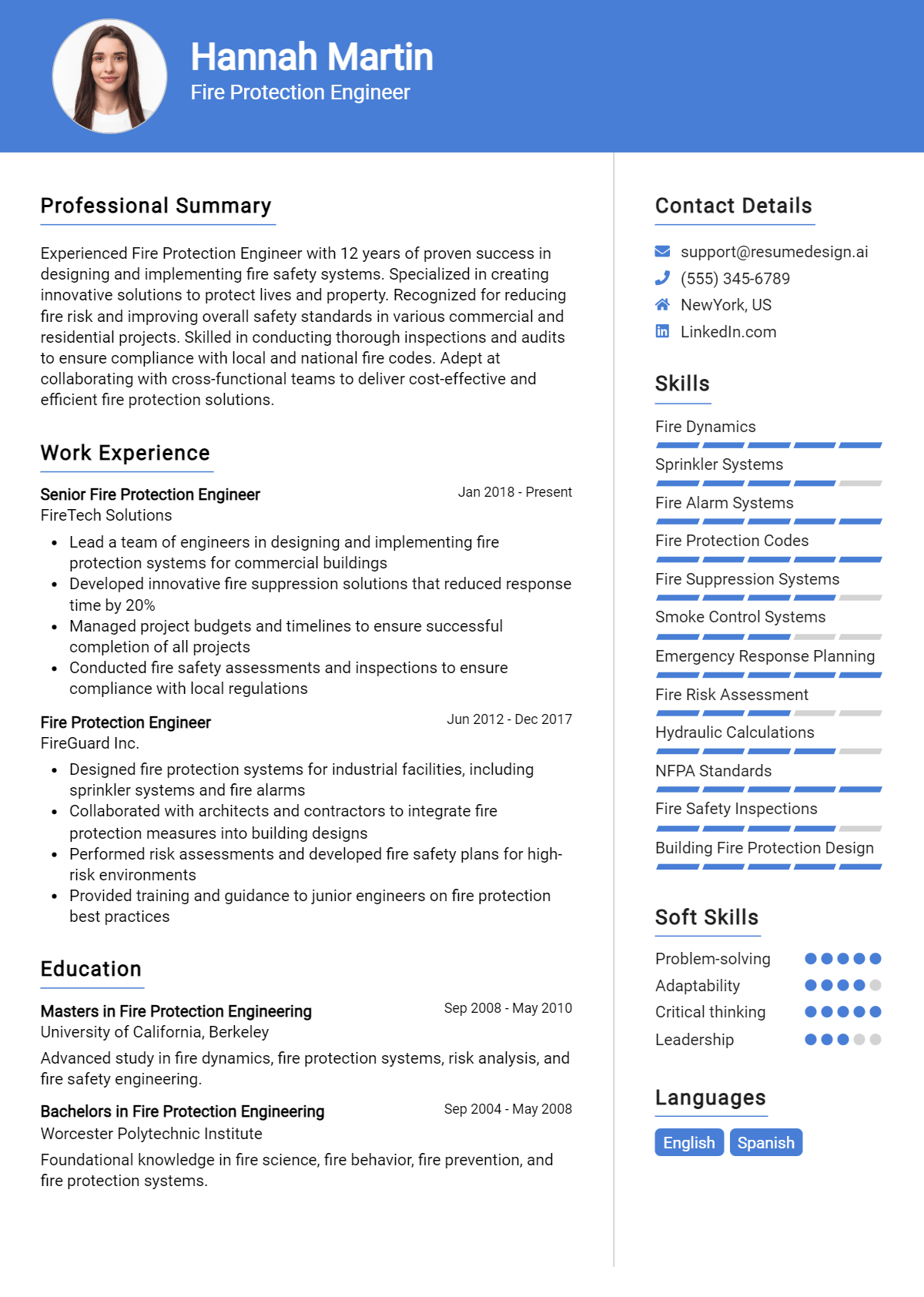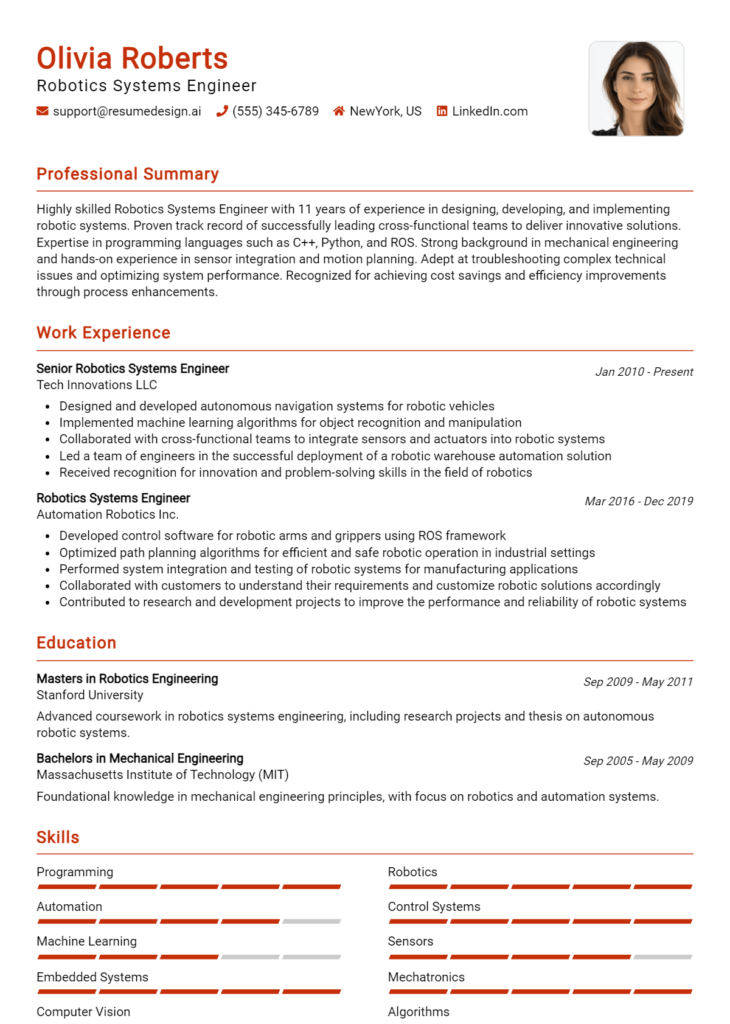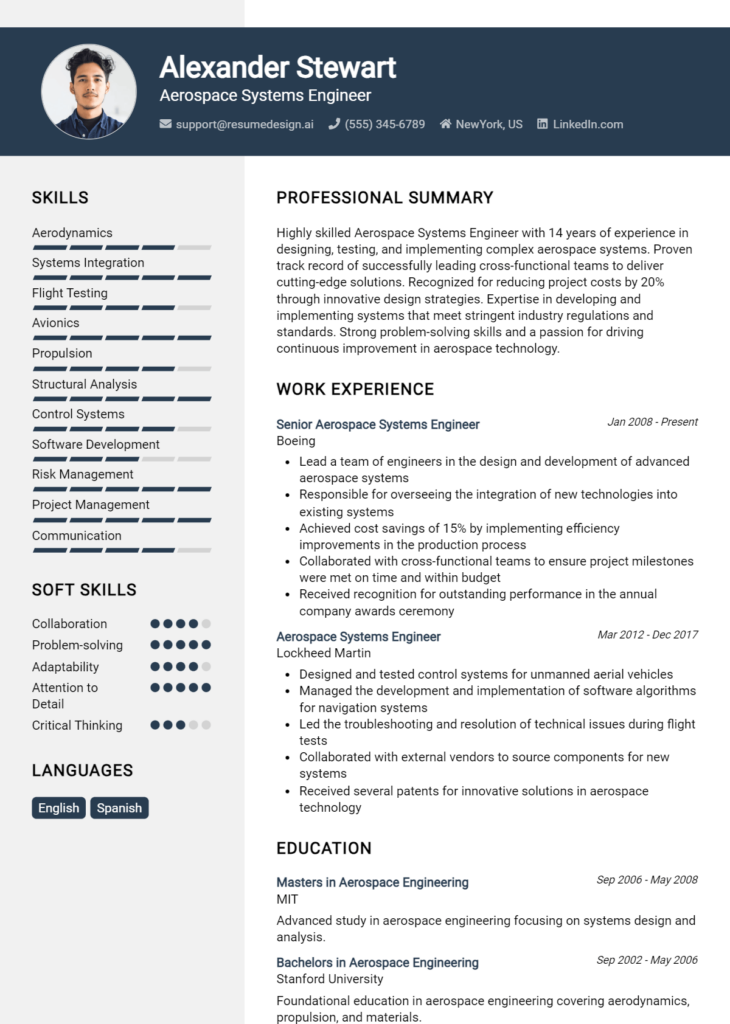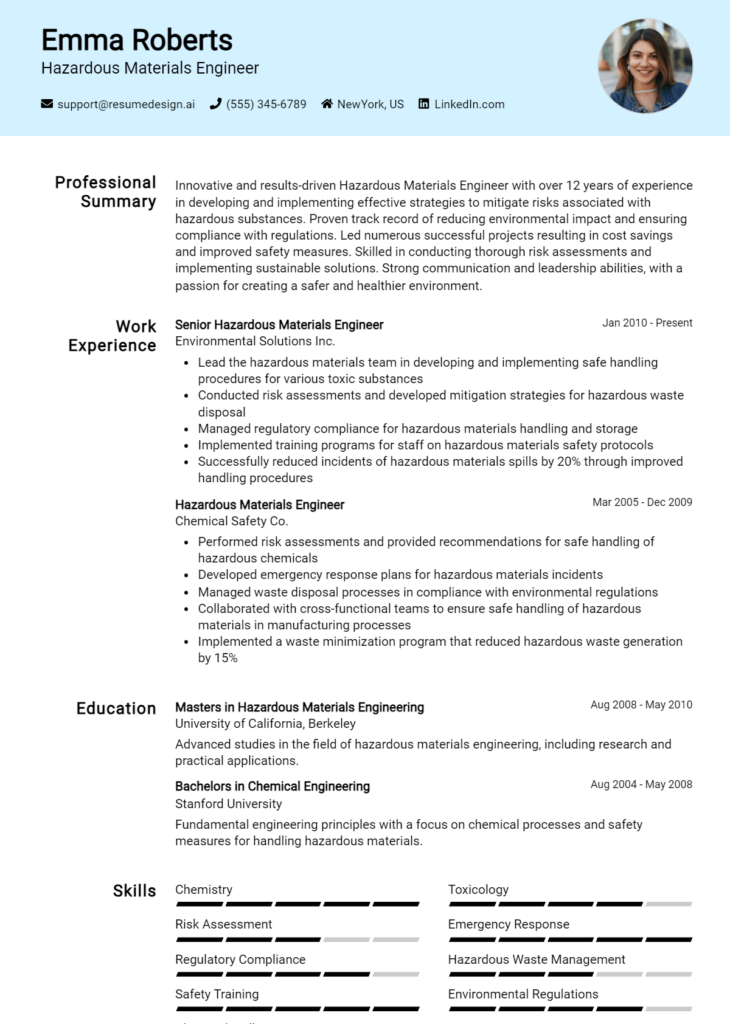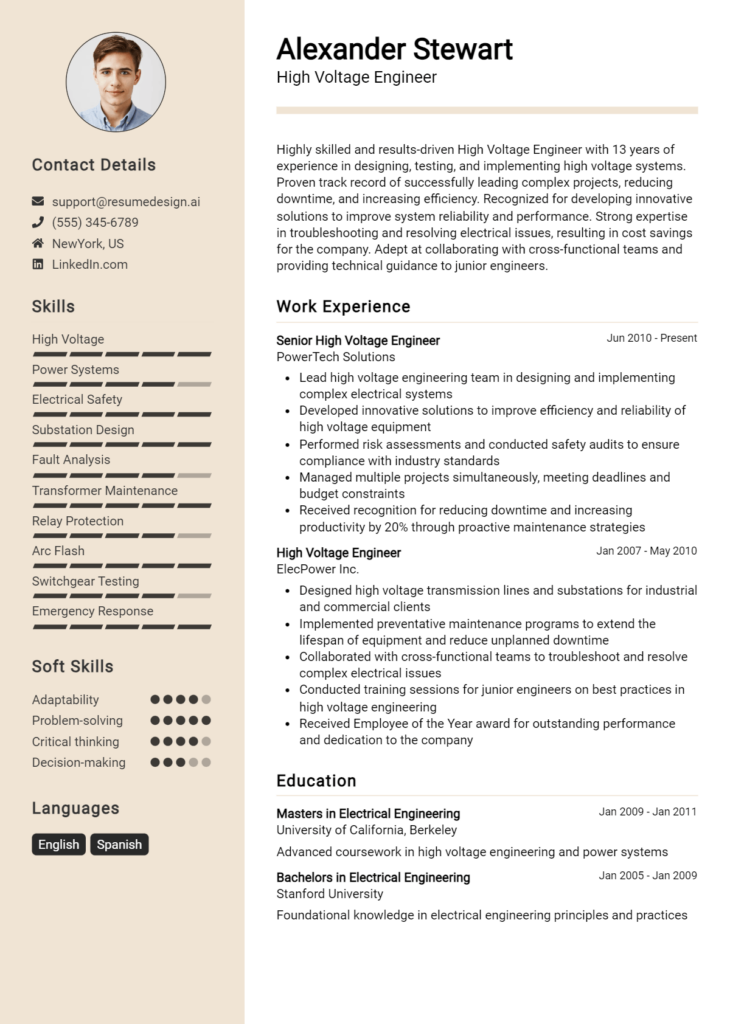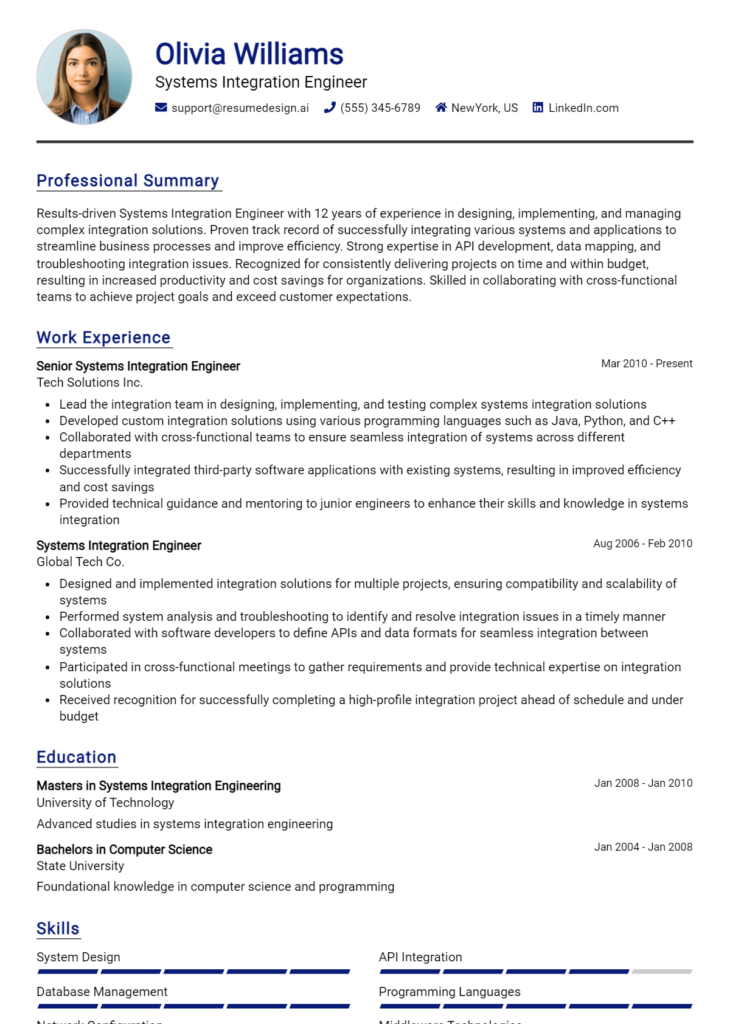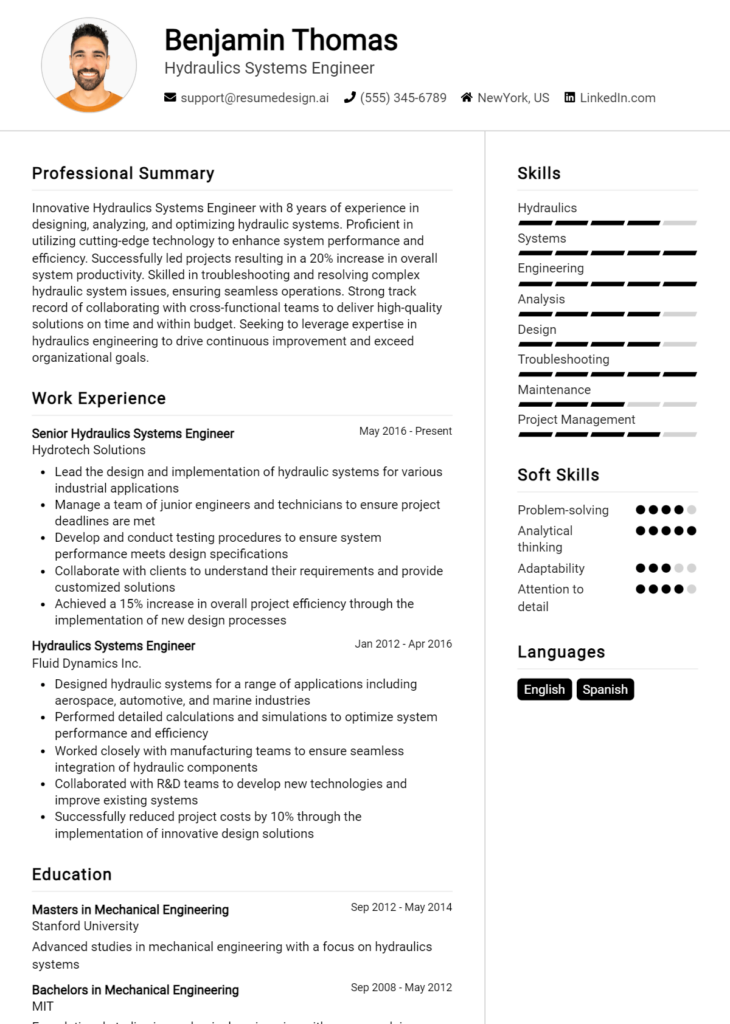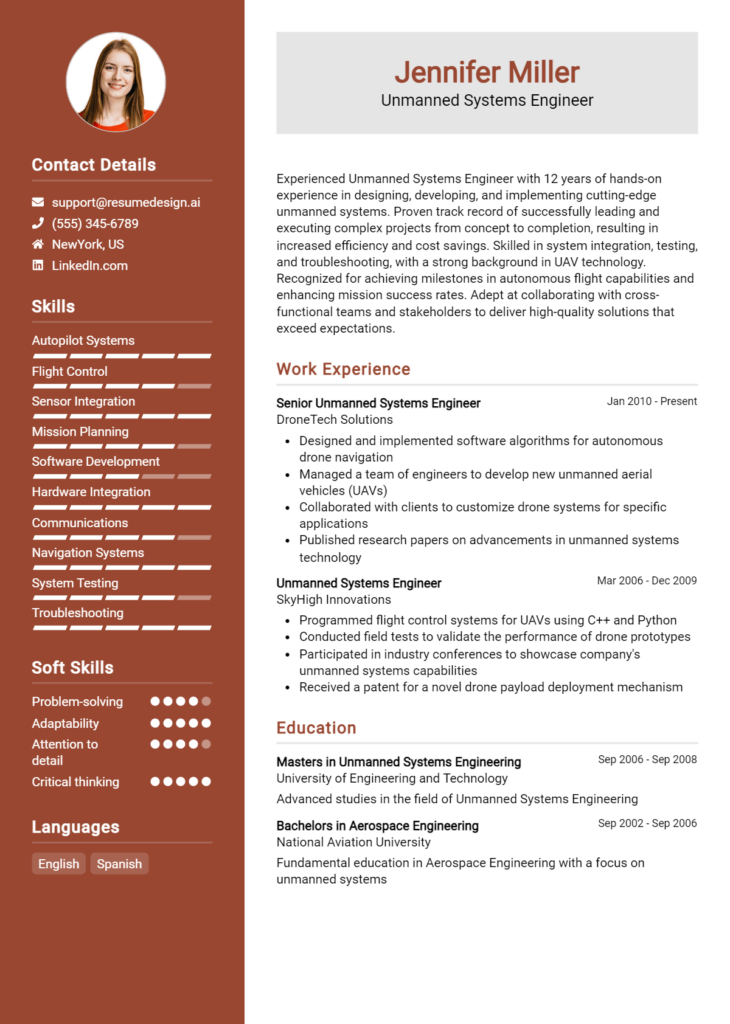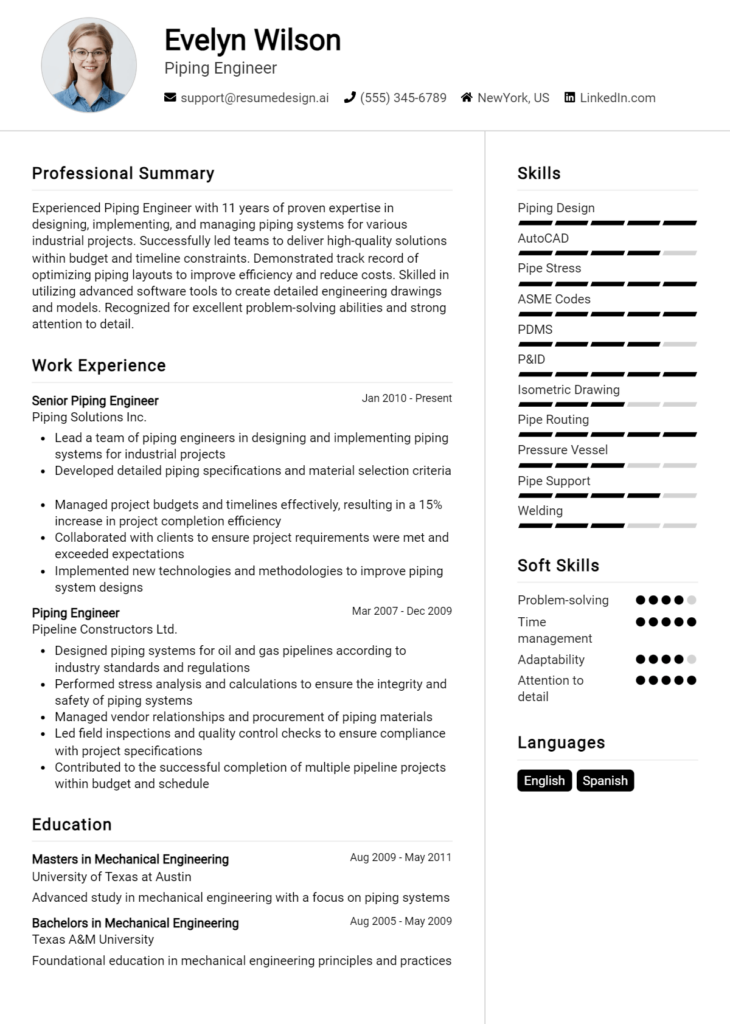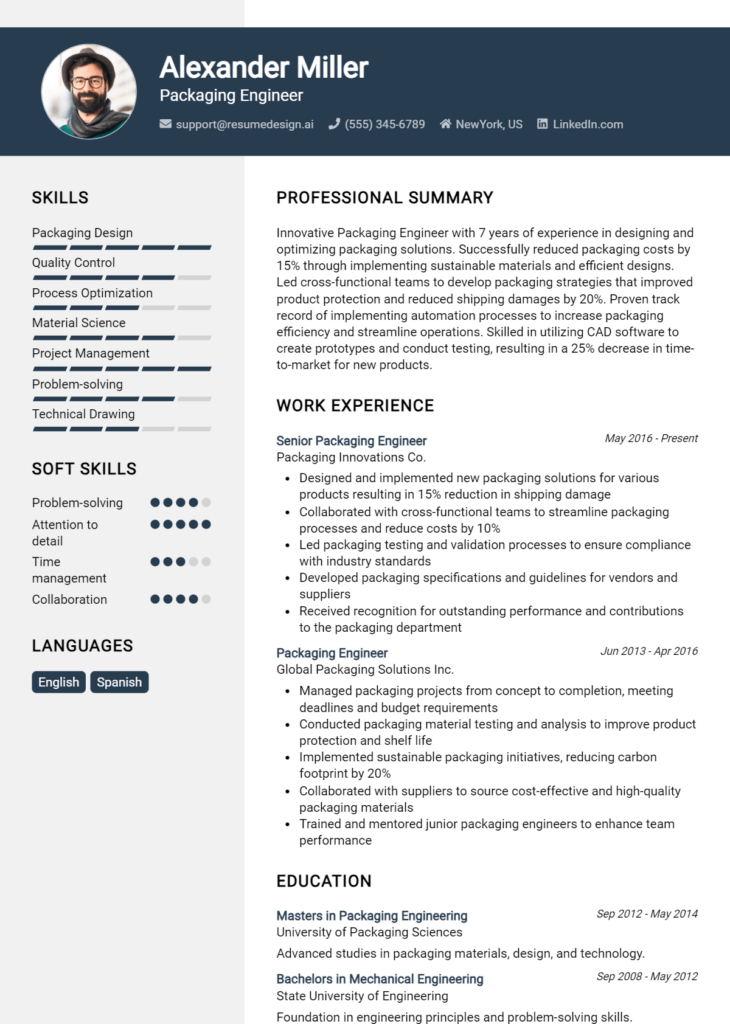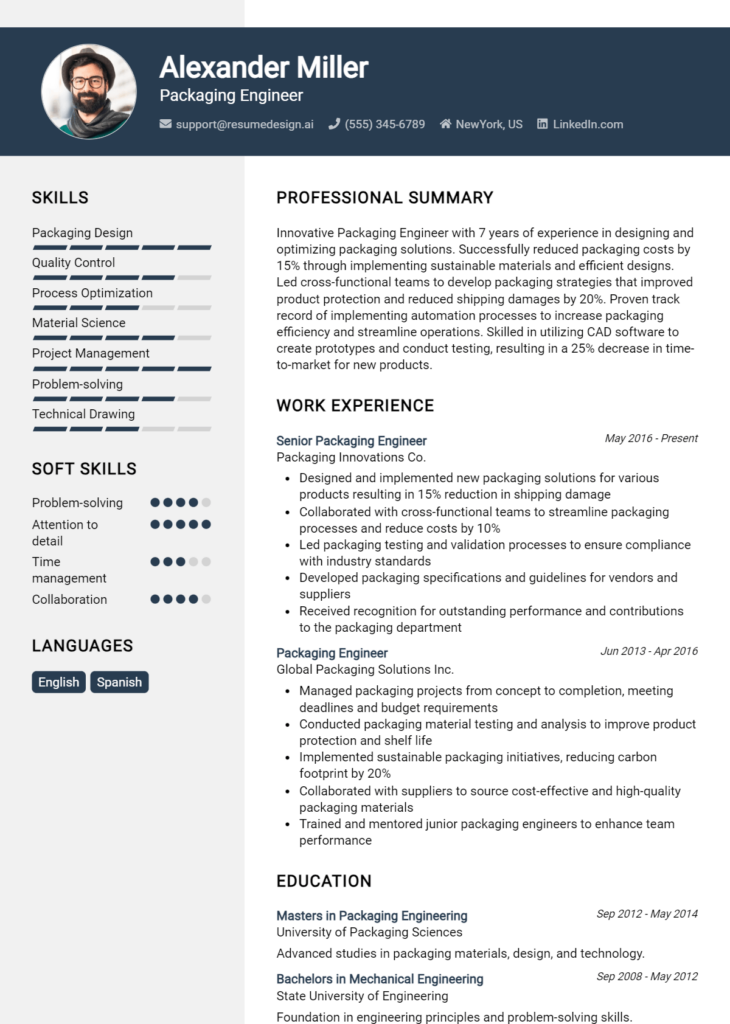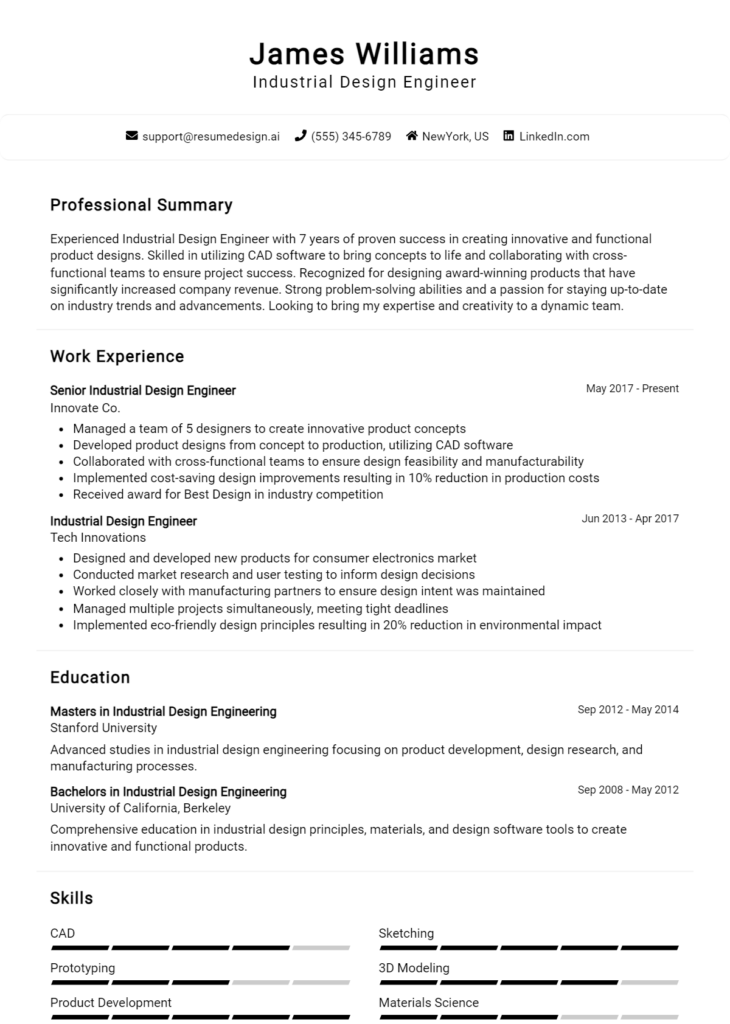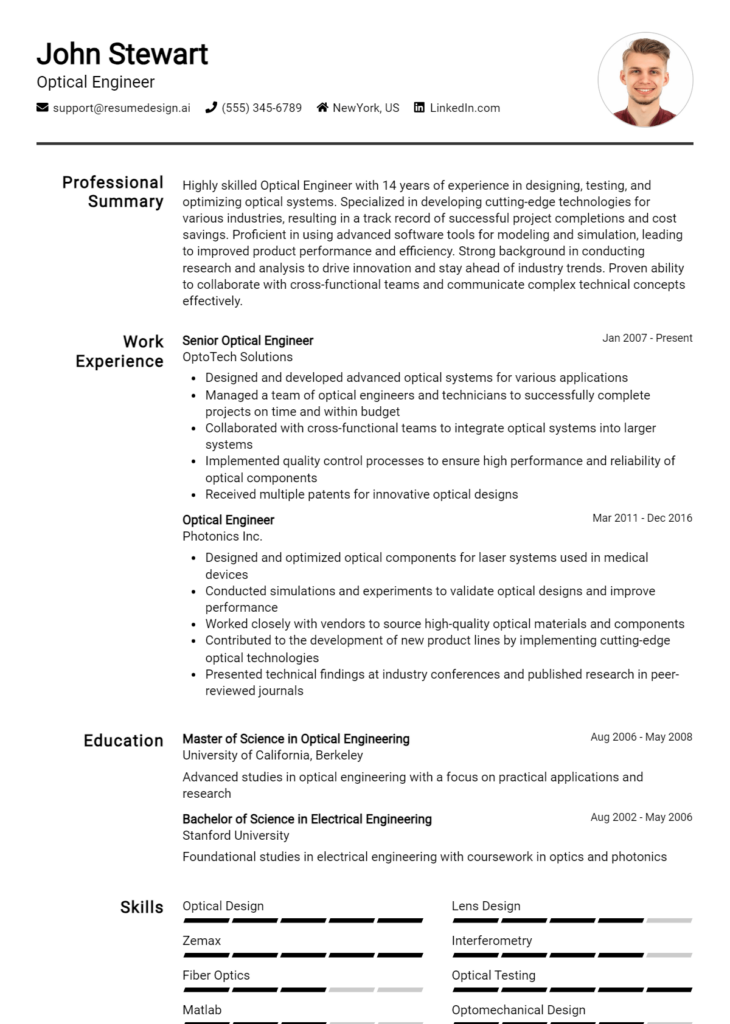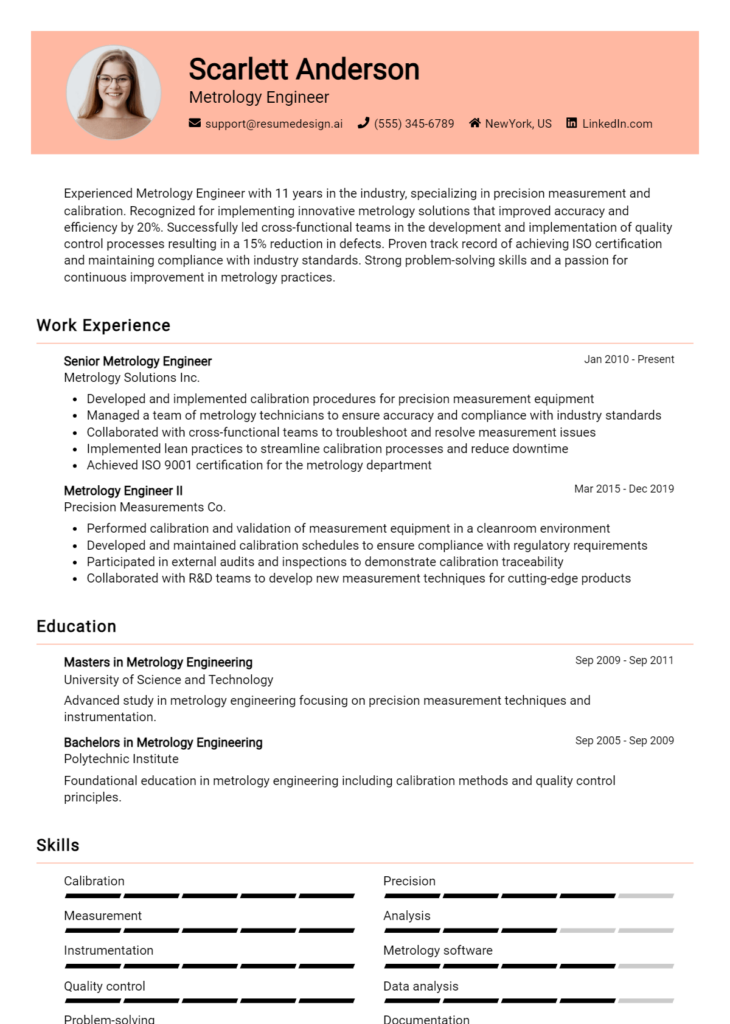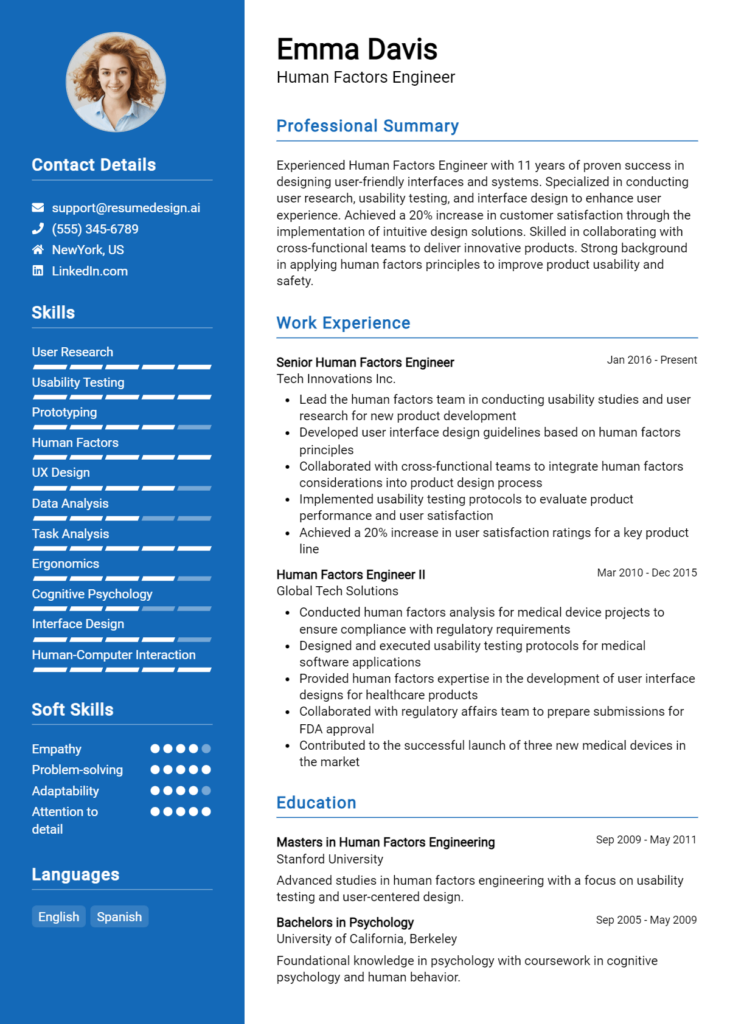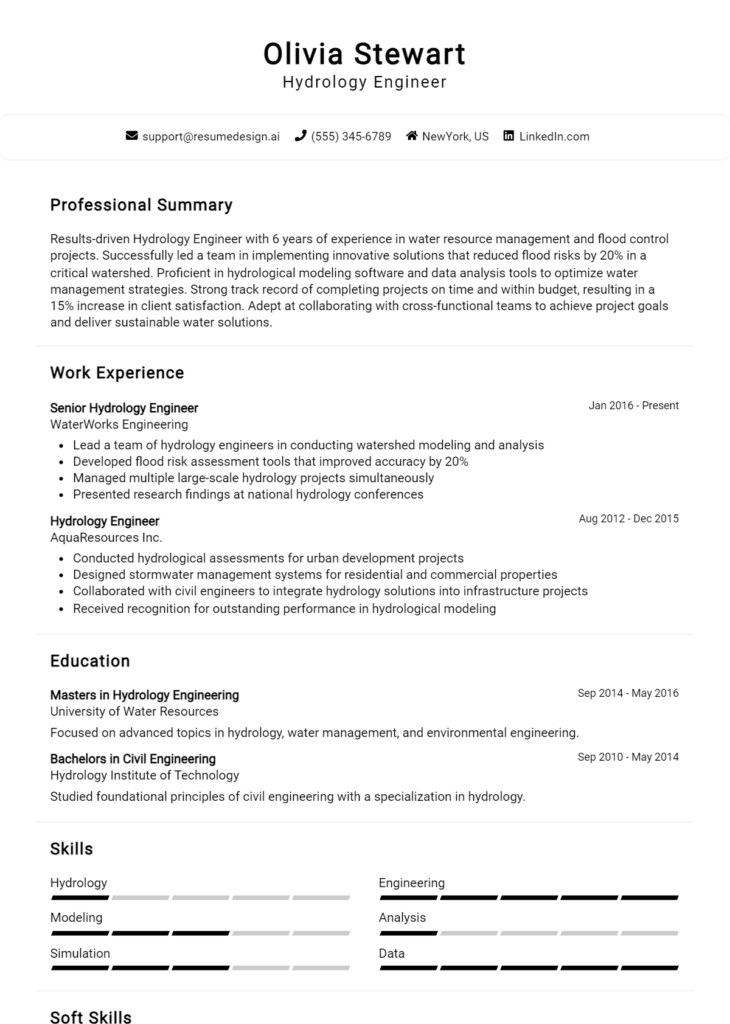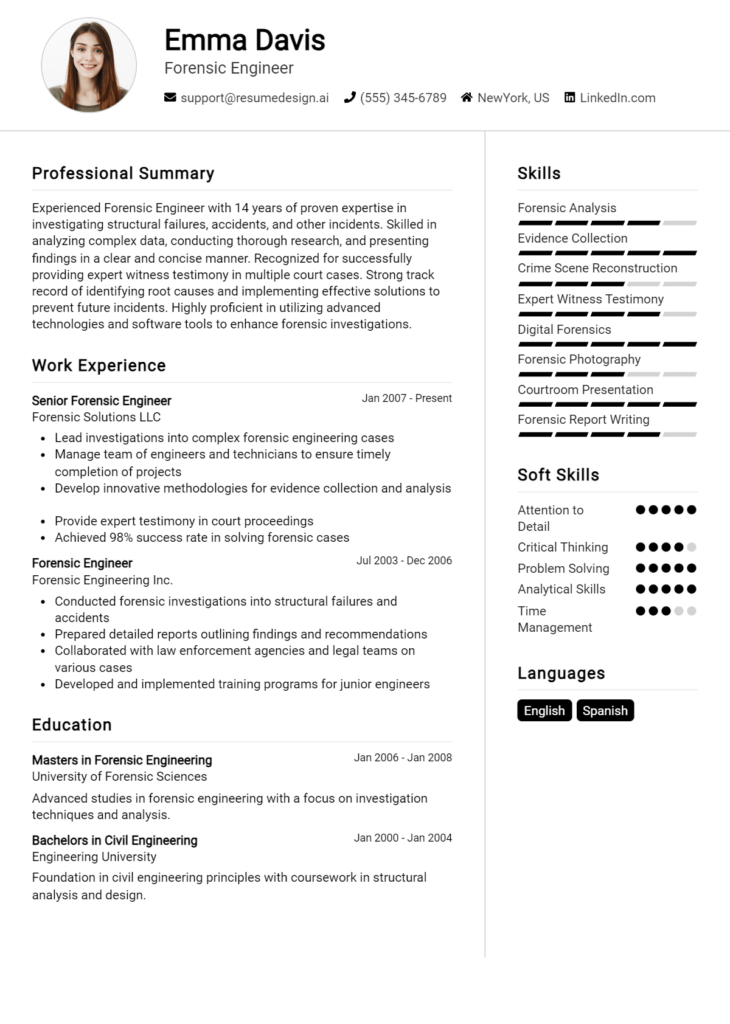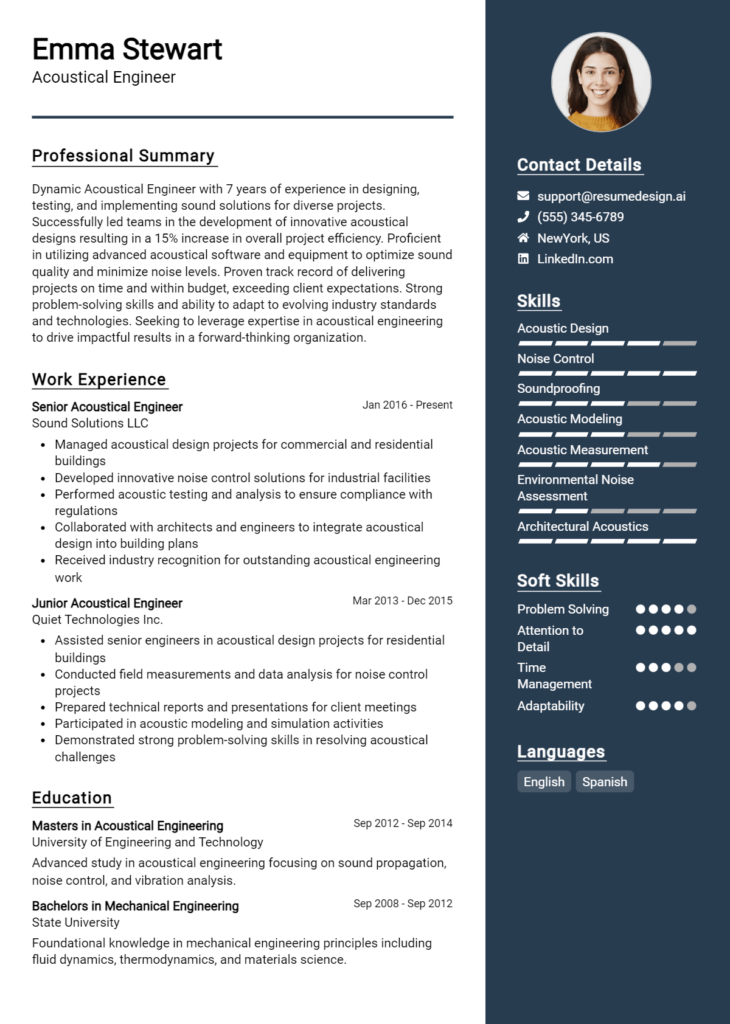Fire Protection Engineer Core Responsibilities
A Fire Protection Engineer plays a crucial role in safeguarding lives and property by designing fire protection systems and ensuring compliance with safety regulations. They bridge various departments, collaborating with architects, contractors, and safety officials to develop effective fire prevention strategies. Essential skills include technical proficiency, operational insight, and strong problem-solving abilities, which are vital for identifying risks and implementing solutions. A well-structured resume highlighting these qualifications can significantly enhance career opportunities and align with organizational safety goals.
Common Responsibilities Listed on Fire Protection Engineer Resume
- Design and evaluate fire protection systems, including alarms and sprinklers.
- Conduct risk assessments and fire safety inspections.
- Develop fire protection engineering plans and specifications.
- Collaborate with multidisciplinary teams on construction projects.
- Ensure compliance with local, state, and federal fire codes.
- Provide fire safety training and education to staff and stakeholders.
- Analyze fire incident reports and recommend improvements.
- Stay updated with emerging fire safety technologies and practices.
- Prepare and present fire safety proposals to clients and management.
- Assist in emergency response planning and drills.
- Review and approve contractor submittals related to fire protection systems.
High-Level Resume Tips for Fire Protection Engineer Professionals
In the competitive field of fire protection engineering, a well-crafted resume is crucial for making a strong first impression on potential employers. Your resume is often the first opportunity to showcase your skills, achievements, and professional journey. As a Fire Protection Engineer, it’s essential to present not only your technical expertise but also your contributions to safety, efficiency, and innovation within the industry. This guide will provide practical and actionable resume tips specifically tailored for Fire Protection Engineer professionals, helping you stand out in a crowded job market.
Top Resume Tips for Fire Protection Engineer Professionals
- Tailor your resume to each job description, ensuring that you highlight the most relevant skills and experiences that match the employer's needs.
- Showcase relevant experience by prioritizing positions and projects that directly relate to fire protection engineering.
- Quantify your achievements with specific metrics, such as reductions in fire incidents, cost savings from implemented safety measures, or successful completion of projects ahead of schedule.
- Highlight industry-specific skills, including knowledge of fire codes, standards, and regulations, as well as proficiency in fire modeling and risk assessment tools.
- Include any certifications relevant to fire protection engineering, such as Certified Fire Protection Specialist (CFPS) or Professional Engineer (PE) designation, to validate your expertise.
- Utilize action verbs to describe your responsibilities and accomplishments, making your contributions clear and compelling.
- Incorporate keywords from the job posting to optimize your resume for Applicant Tracking Systems (ATS) and improve visibility.
- Keep your resume concise and focused, ideally fitting onto one page, while ensuring that all information is relevant and impactful.
- Consider adding a summary statement at the top that encapsulates your experience, skills, and what you bring to the role, making it easier for hiring managers to see your value at a glance.
By implementing these tips, you can significantly enhance your resume, increasing your chances of landing a job in the Fire Protection Engineer field. A polished and well-structured resume not only demonstrates your qualifications but also reflects your professionalism and commitment to the industry, making you a more appealing candidate to potential employers.
Why Resume Headlines & Titles are Important for Fire Protection Engineer
In the competitive field of fire protection engineering, a well-crafted resume headline or title serves as a crucial first impression for job seekers. This succinct phrase not only captures the essence of the candidate's qualifications but also has the power to immediately grab the attention of hiring managers. A strong headline should summarize key skills, experiences, or accomplishments in a concise and relevant manner, directly aligning with the specific position being sought. By doing so, it sets the tone for the rest of the resume and encourages hiring managers to delve deeper into the applicant's background.
Best Practices for Crafting Resume Headlines for Fire Protection Engineer
- Be concise: Aim for a headline that is brief yet informative, ideally under 12 words.
- Be specific: Tailor your headline to the fire protection engineering role you are applying for.
- Highlight key qualifications: Include specific skills or experiences that are relevant to the job.
- Use action-oriented language: Start with dynamic verbs or impactful descriptors.
- Incorporate industry keywords: Utilize terms that resonate within the fire protection engineering field.
- Avoid generic phrases: Steer clear of overused terms that do not add value or specificity.
- Showcase certifications: If applicable, mention any relevant certifications in your headline.
- Keep it professional: Ensure the tone and language are appropriate for the engineering industry.
Example Resume Headlines for Fire Protection Engineer
Strong Resume Headlines
"Certified Fire Protection Engineer with 10+ Years Experience in Life Safety Systems"
“Innovative Fire Safety Specialist with Proven Track Record in Risk Assessment”
“Dedicated Fire Protection Engineer Specializing in Code Compliance and Fire Safety Design”
Weak Resume Headlines
“Engineer Looking for Job”
“Fire Protection Professional”
The effectiveness of the strong headlines lies in their ability to convey specific expertise and accomplishments that directly relate to fire protection engineering, making it immediately clear to hiring managers why the candidate is a strong fit for the position. In contrast, the weak headlines lack specificity and impact, failing to provide any meaningful insight into the candidate's qualifications or unique value, which can leave a less favorable impression in the competitive hiring landscape.
Writing an Exceptional Fire Protection Engineer Resume Summary
A well-crafted resume summary is crucial for a Fire Protection Engineer, as it serves as the first impression for hiring managers. This concise overview quickly captures attention by highlighting key skills, experience, and accomplishments that are directly relevant to the job role. An impactful summary not only showcases the candidate's expertise in fire protection systems and compliance with safety regulations but also emphasizes their ability to contribute positively to the organization. By tailoring the summary to reflect the specific job description, candidates can effectively stand out in a competitive job market.
Best Practices for Writing a Fire Protection Engineer Resume Summary
- Quantify achievements: Use numbers and metrics to demonstrate your impact, such as projects completed or cost savings.
- Focus on skills: Highlight technical skills relevant to fire protection engineering, such as risk assessment and code compliance.
- Tailor the summary: Customize the summary for each job application to reflect the specific requirements of the position.
- Keep it concise: Aim for 3-5 sentences that are impactful and to the point, avoiding unnecessary jargon.
- Use action verbs: Start sentences with strong action verbs to convey your accomplishments dynamically.
- Highlight certifications: Mention relevant certifications, such as Professional Engineer (PE) or Certified Fire Protection Specialist (CFPS).
- Showcase collaboration: Emphasize experience working with multidisciplinary teams, as this is essential in fire protection projects.
- Include industry knowledge: Demonstrate understanding of industry standards and regulations that govern fire safety.
Example Fire Protection Engineer Resume Summaries
Strong Resume Summaries
Dynamic Fire Protection Engineer with over 8 years of experience in designing and implementing fire safety systems. Successfully led a project that reduced fire incident rates by 40% through innovative sprinkler system designs, achieving a $250,000 cost savings for the organization.
Detail-oriented Fire Protection Engineer with a proven track record of ensuring compliance with NFPA codes. Spearheaded a multi-site safety evaluation initiative that improved inspection scores by 30%, enhancing overall facility safety and reducing liability risk.
Results-driven Fire Protection Engineer specializing in risk assessment and emergency response planning. Developed and executed comprehensive fire safety protocols that decreased response times by 25%, significantly improving emergency preparedness for a large manufacturing facility.
Weak Resume Summaries
Fire Protection Engineer with some experience in the field. I work on fire safety and related projects.
Experienced engineer looking for a new position in fire protection. I have worked on various projects.
The strong resume summaries are effective because they are specific, quantify achievements, and directly relate to the responsibilities of a Fire Protection Engineer. They highlight measurable results and demonstrate the candidate's expertise and impact in their previous roles. In contrast, the weak summaries lack detail and measurable outcomes, making them too vague and generic to capture the attention of hiring managers.
Work Experience Section for Fire Protection Engineer Resume
The work experience section of a Fire Protection Engineer resume is critical as it provides a comprehensive view of the candidate's practical skills, expertise, and accomplishments in the field. This section not only highlights technical skills related to fire safety systems, risk assessment, and code compliance, but also emphasizes the ability to lead teams and deliver high-quality solutions. By quantifying achievements and aligning experience with industry standards, candidates can effectively demonstrate their value to potential employers, showcasing a proven track record in enhancing safety and compliance in various environments.
Best Practices for Fire Protection Engineer Work Experience
- Use industry-specific terminology to demonstrate expertise.
- Quantify achievements with specific metrics and outcomes.
- Highlight leadership roles in project management and team collaboration.
- Focus on relevant technical skills, such as fire modeling and risk analysis.
- Tailor experience descriptions to align with job descriptions and industry standards.
- Include certifications and training that enhance your qualifications.
- Showcase successful project completions and compliance with regulations.
- Utilize action verbs to convey a sense of initiative and impact.
Example Work Experiences for Fire Protection Engineer
Strong Experiences
- Led a team of engineers in designing a fire suppression system for a 500,000 sq ft commercial facility, resulting in a 30% reduction in fire hazard ratings.
- Implemented a fire safety training program that reduced workplace incidents by 40% over two years, enhancing overall employee safety awareness.
- Conducted comprehensive fire risk assessments for multiple high-rise buildings, achieving 100% compliance with local fire codes and regulations.
- Managed a $1 million project to upgrade existing fire alarm systems, successfully completing the project 15% under budget and ahead of schedule.
Weak Experiences
- Assisted with fire safety projects.
- Participated in team meetings about fire protection.
- Worked on fire safety systems.
- Helped with some project tasks.
The examples categorized as strong experiences are considered effective because they provide specific, quantifiable outcomes that demonstrate leadership, technical expertise, and successful collaboration on projects. They paint a clear picture of the candidate's impact in previous roles, making them more appealing to employers. In contrast, the weak experiences lack detail and measurable results, making them less compelling and failing to showcase the candidate's true capabilities and contributions in the field of fire protection engineering.
Education and Certifications Section for Fire Protection Engineer Resume
The education and certifications section of a Fire Protection Engineer resume plays a crucial role in establishing a candidate's qualifications and expertise. This section not only showcases the applicant's academic background but also emphasizes their commitment to continuous learning through industry-relevant certifications and specialized training. By detailing pertinent coursework, recognized certifications, and ongoing professional development, candidates can significantly enhance their credibility and demonstrate alignment with the specific requirements of the job role. This strategic presentation of education and certifications can ultimately set a candidate apart in a competitive field.
Best Practices for Fire Protection Engineer Education and Certifications
- Include only relevant degrees and certifications that directly relate to fire protection engineering.
- List the most advanced or industry-recognized credentials first to draw attention to your qualifications.
- Provide specific details about relevant coursework that underlines your knowledge and skills in fire protection systems.
- Highlight any specialized training programs or workshops that enhance your expertise in fire safety and design.
- Include expiration dates and renewal information for certifications to demonstrate active engagement in the field.
- Use clear and concise language to ensure easy readability and quick access to important information.
- Tailor the section for each job application to reflect the specific education and certifications that align with the employer’s needs.
- Consider including memberships in professional organizations related to fire protection engineering.
Example Education and Certifications for Fire Protection Engineer
Strong Examples
- Bachelor of Science in Fire Protection Engineering, University of Maryland, 2018
- Certified Fire Protection Specialist (CFPS), National Fire Protection Association, 2020
- Master’s Certificate in Fire Investigation, University of New Haven, 2021
- Relevant Coursework: Fire Dynamics, Building Codes and Standards, Fire Safety Systems Design
Weak Examples
- Bachelor of Arts in Psychology, State University, 2015
- Certification in Basic First Aid, Red Cross, 2019
- Diploma in Home Repair, Community College, 2020
- Relevant Coursework: Introduction to Sociology, Art History
The strong examples are considered effective because they directly relate to the field of fire protection engineering, showcasing relevant degrees and certifications that demonstrate the candidate's expertise and commitment to the profession. In contrast, the weak examples illustrate qualifications that are either unrelated or less relevant to the role of a Fire Protection Engineer, failing to highlight the necessary skills and knowledge required in this specialized field.
Top Skills & Keywords for Fire Protection Engineer Resume
As a Fire Protection Engineer, having a well-crafted resume that highlights both hard and soft skills is crucial for standing out in a competitive job market. Employers seek professionals who not only possess the technical expertise necessary for designing and implementing effective fire protection systems but also demonstrate the interpersonal abilities required to collaborate with diverse teams and communicate complex ideas clearly. A thoughtfully organized list of skills can effectively showcase your qualifications and experience, making it easier for hiring managers to recognize your potential contributions to their organization. By prioritizing the right skills in your resume, you can enhance your chances of securing an interview and advancing your career in fire protection engineering.
Top Hard & Soft Skills for Fire Protection Engineer
Soft Skills
- Problem-solving
- Communication
- Teamwork
- Leadership
- Attention to detail
- Critical thinking
- Time management
- Adaptability
- Project management
- Interpersonal skills
Hard Skills
- Knowledge of fire codes and standards
- Fire protection system design
- Hazard analysis
- Risk assessment
- Fire modeling software proficiency
- Understanding of fire alarm and suppression systems
- Building design and construction principles
- Technical writing
- AutoCAD and drafting skills
- Fire investigation techniques
For more guidance on structuring your resume, including how to effectively highlight your skills and work experience, consider exploring additional resources that can help you present your qualifications in the best light.
Stand Out with a Winning Fire Protection Engineer Cover Letter
Dear [Hiring Manager's Name],
I am writing to express my interest in the Fire Protection Engineer position at [Company Name], as advertised on [where you found the job listing]. With a strong educational background in fire protection engineering and over [X years] of hands-on experience in designing and implementing fire safety systems, I am excited about the opportunity to contribute to your team. My commitment to enhancing fire safety standards aligns perfectly with [Company Name]'s mission to protect lives and property through innovative solutions.
In my previous role at [Previous Company Name], I successfully led multiple projects that involved the design and analysis of fire protection systems for commercial and industrial facilities. My responsibilities included conducting risk assessments, developing fire protection plans, and collaborating with cross-functional teams to ensure compliance with local and national fire codes. I am particularly proud of a project where I implemented a comprehensive fire suppression system that resulted in a [specific outcome, e.g., a 30% reduction in fire incidents], demonstrating my ability to blend technical expertise with practical application.
I am proficient in using industry-standard software, such as AutoCAD and PyroSim, to create detailed fire protection layouts and simulations. Additionally, my strong communication skills enable me to effectively present complex information to stakeholders, ensuring that everyone is on board with safety measures and compliance requirements. I am eager to bring my analytical mindset and collaborative spirit to [Company Name], contributing to innovative fire safety solutions that meet the evolving needs of your clients.
Thank you for considering my application. I look forward to the opportunity to discuss how my skills and experiences align with the goals of [Company Name]. I am excited about the possibility of working together to enhance fire safety and protection in our communities.
Sincerely,
[Your Name]
[Your Phone Number]
[Your Email Address]
Common Mistakes to Avoid in a Fire Protection Engineer Resume
When crafting a resume for a Fire Protection Engineer position, it is crucial to highlight relevant skills, experiences, and qualifications effectively. However, many candidates make common mistakes that can undermine their chances of landing an interview. Avoiding these pitfalls can help you present a polished and professional resume that stands out to potential employers.
Vague Job Descriptions: Failing to provide specific details about previous roles can leave hiring managers unclear about your responsibilities and achievements. Use quantifiable metrics when possible.
Ignoring Relevant Certifications: Not mentioning critical certifications, such as NICET or PE, can be a missed opportunity to showcase your qualifications and compliance with industry standards.
Overly Technical Language: While it’s important to demonstrate technical knowledge, using excessive jargon can alienate readers who may not be familiar with specific terms. Strive for clarity and accessibility.
Neglecting Soft Skills: Focusing solely on technical abilities may overlook essential soft skills like teamwork, communication, and problem-solving, which are equally important in engineering roles.
Formatting Issues: A cluttered layout or inconsistent formatting can make your resume difficult to read. Use clear headings, bullet points, and a clean design to enhance readability.
Omitting Keywords: Failing to incorporate industry-specific keywords from the job description may result in your resume being overlooked by applicant tracking systems (ATS). Tailor your resume to each job application.
Lack of Tailoring: Submitting a generic resume without customizing it for the specific role can signal a lack of effort and interest. Highlight experiences and skills that align with the job requirements.
Ignoring Professional Development: Not showcasing ongoing education or training can suggest stagnation. Include workshops, seminars, or courses that demonstrate your commitment to staying current in the field.
Conclusion
As we conclude our exploration of the vital role of a Fire Protection Engineer, it's essential to recognize the key responsibilities that define this profession. Fire Protection Engineers play a crucial role in designing systems and strategies to prevent and mitigate fire hazards, ensuring safety in various environments, from commercial buildings to industrial sites. Their expertise not only involves implementing fire safety codes and regulations but also requires a deep understanding of fire dynamics, materials, and risk assessment methodologies.
In today's competitive job market, having a standout resume is critical for Fire Protection Engineers looking to advance their careers. As you reflect on your qualifications and achievements, consider updating your resume to highlight your relevant experience, technical skills, and certifications.
To assist you in this process, take advantage of the resources available to craft a compelling resume. Explore resume templates tailored to highlight your expertise in fire protection engineering. Utilize the resume builder for a user-friendly experience that allows you to customize your document effortlessly. For inspiration, browse through our resume examples that showcase successful Fire Protection Engineers and their career paths. Additionally, don't overlook the importance of a strong introduction—check out our cover letter templates to complement your resume and make a lasting impression on potential employers.
Now is the time to take action! Review your Fire Protection Engineer resume, make necessary updates, and leverage these tools to enhance your job application. Your next career opportunity awaits!

